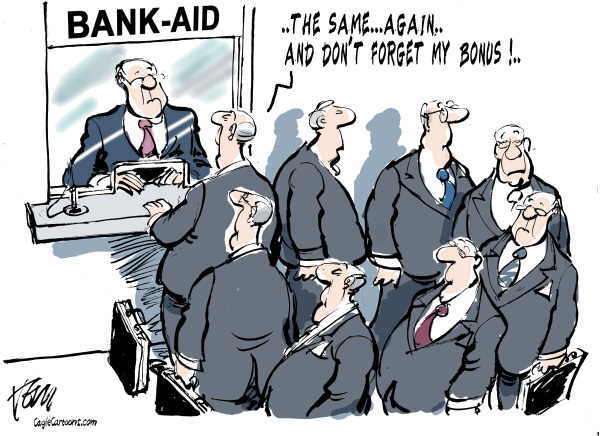Search
Democracy Links
Member's Off-site Blogs
all in together .....

What is it about bankers' pay that makes the hard-pressed majority feel that finance capitalism is a conspiracy against them? Could it be that, more than three years after the credit crunch of 2008, we feel that the unfair rewards in the sector that caused the crisis continue unabated?
Could it be that the rewards now seem even more unfair because we, the taxpayers, put up the security to bail out the banks? Could it be that we feel that politicians, who mouthed slogans about fairness and how they would put an end to excessive pay, have played a cynical game? Could it be that the way banks pay their top people seems designed to confuse us, even when we, the taxpayers, are their shareholders.
All of those. The fuss over the bonus awarded to Stephen Hester, boss of RBS, a nationalised bank, has been running all week on the basis that it was conveniently just under a round £1m. David Cameron, one moment has been saying it was nothing to do with him, the next moment claiming credit for having cut it to 60 per cent of what it could have been. As we report today, Mr Hester's bonus turns out to have been a highly coloured decoy designed to draw outrage away from the main story, which is that the total sum he can hope to collect from his three years in charge of the bank, already heading towards £39m, could reach £50m in a couple of years more if the share price performs well.
That we have been distracted by a tiny detail in a show of monstrous greed is bound to leave us feeling once again bamboozled.
As Paul Vallely argues on the previous page, something has changed in people's perception of fairness, and it is simply impossible for Mr Cameron and Nick Clegg, his accessory in inequity, to maintain that we are "all in this together" when such vast riches are lavished on a public employee at the same time as capping the benefits of the poorest.
Now, The Independent on Sunday is not anti-capitalist. In many ways, we see the distorted pay of bankers as the product of market failure. It is set by a small group engaged in anti-competitive behaviour who manage to persuade weak politicians that their knowledge is so specialist that its price must be high. We realise that turning a leading international bank round is a hard and complex task and that there are few people who have the skills needed to do it well. We accept the argument that the taxpayer should be prepared to pay talented executives well for restoring the bank's value so that we may secure a return on our investment when it comes to be sold back to the private sector. We further accept that their pay should have a performance-related element tied to the share price, which is the main objective measure of their success.
But we simply do not accept that Mr Hester is the only person who could secure the taxpayers' interest, or that anyone needs to be paid so much to give them sufficient incentive to do the job well. For the market to allocate wages like this in the private sector is evidence of restrictive practice and what even Mr Cameron calls "crony capitalism". For the Government to agree to wages on this scale in a publicly owned company is craven folly.
The Prime Minister's only defence is that Mr Hester was hired and his terms agreed, under some cultural voodoo known as "arm's-length" arrangements, by the Labour government. Ed Miliband was then a member of the cabinet that approved the deal, too cowed by the mystique of the City of London to ask simple questions, such as: "Do you know whose money this is?"
But Mr Cameron is the one who now has the questions to answer. He has sought in recent weeks to anticipate the banks' bonus season by drivelling on about responsible capitalism and how the Government is going to take tough action on unfair rewards at the top by giving shareholders more power and insisting on transparency. How hollow those words sound today. At RBS, he is the shareholders' representative, and far from asserting his power he has gone along with everything to which the banks' executives have helped themselves. As for transparency, it has taken several days for the full obscene scale of Mr Hester's pay to be brought into the light of day.
As a nation, we are tired of being taken for fools, and Mr Cameron will have to pay a terrible price if he does not ensure that we get better value for the money we sank into our nationalised banks.
- By John Richardson at 29 Jan 2012 - 4:42pm
- John Richardson's blog
- Login or register to post comments
Recent comments
12 hours 19 min ago
12 hours 59 min ago
13 hours 22 min ago
13 hours 40 min ago
14 hours 42 min ago
19 hours 54 min ago
20 hours 17 min ago
23 hours 13 min ago
1 day 12 hours ago
1 day 14 hours ago